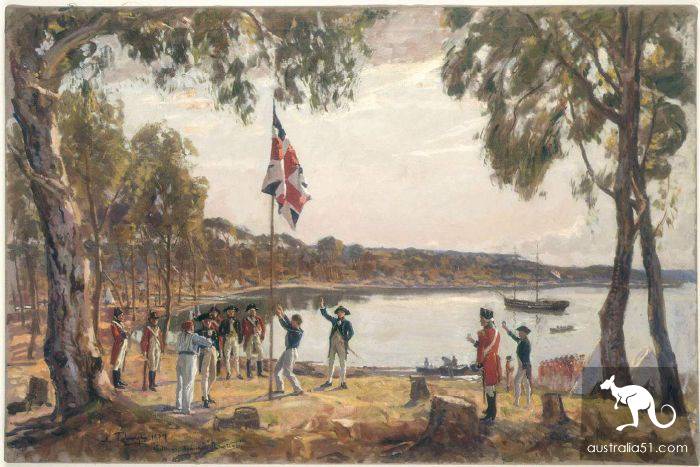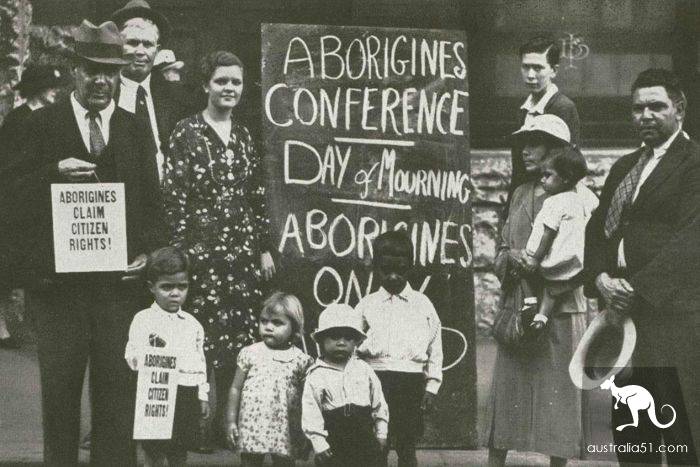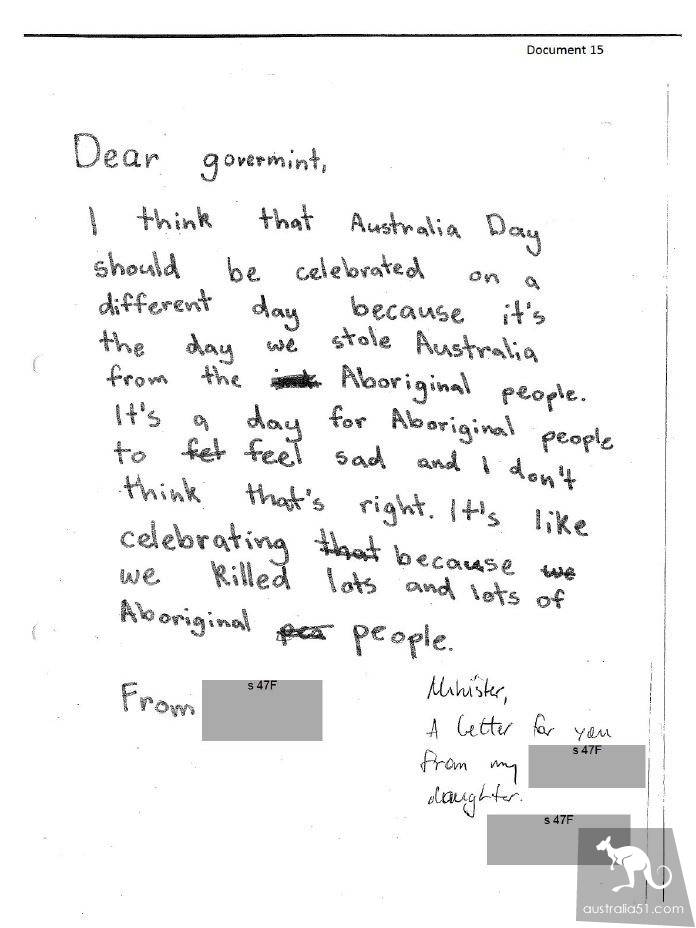(Australia Day), the annual Australian day, has arrived again, but ABC, the Australian broadcaster, received a letter from a girl to government, Australia, a few days ago pleading with national leaders to change the date of Australia Day.
Key points:
- Australian Day originated from the date of arrival of the first Fleet in Port Jackson in 1788
- It was not until 1994 that Australian Day became a national public holiday
- Descendants of the first Fleet are proud of January 26, but the Australian aborigines described it as a "sad" invasion day
- In fact, government at the state level can change the date of the state`s national public holidays without the approval of the Prime Ministe
In the handwritten letter, the little girl wrote with a tender brush: "this is a sad day for the aborigines, and I don`t think it`s right." She also believes January 26 is the day Britain "stole" Australia from aborigines, starting with "a lot" of killing.
In fact, disputes in Australia over January 26 as Australian Day have never stopped, and there have been many protest against Australian Day in history. So, how did all this happen and why did it have a huge impact? Below, the Australian Broadcasting Corporation will take you to learn about the previous life of Australian Day.
Why January 26?
On January 26 of each year, city halls in many parts of Australia hold naturalization ceremonies, but some participants may not know why they chose this day as Australia Day.
In 1788, 11 vessels from the Royal Navy`s first Fleet arrived in (Sydney Cove)., Sydney Bay. Arthur Philip, the fleet`s supreme commander, was appointed by the British government at the time to lead 1400 people to build a new British colony on the other side of the world.
By January 20, 1788, the entire fleet had crossed the Indian Ocean in two separate formations, rendezvous at (Botany Bay) in Plant Bay after the last voyage. On January 26 th, the Fleet moved to the more suitable Jackson Port (Port Jackson), a day that will be commemorated forever.
On the face of it, the British colony was established to ease the overcrowding in British jails as a result of the loss of American colonies, and another less well-known reason is that it faces the colonial interests of France and other European countries. Consolidate Britain`s presence in the South Pacific.
At first, people called January 26 th a variety of names, such as "creation Day", "Anniversary" and so on. It was not until 1946 that the term Australia Day was unified throughout the country. It was not until 1994 that Australian Day became a national public holiday in Australia.

Arthur Philip`s first Fleet arrived at Jackson Port on January 26, 1788, a day that later became a controversial Australian Day. (Algernon Talmage/State Library of NSW, public domain)
Since the middle of the 20 th century, a variety of citizen ceremonies and activities have added light to the Australian Day. For example, some municipal halls will hold naturalization ceremonies, and the Australian person of the year award (the Australian of the Year) will be announced on that day, and some of the medals awarded to the Australian citizen will also be awarded on that day.
Why is Australia Day controversial?
The different positions you take when you look at the problem may explain the problem.
Jon Fellen (Jon Fearon), chairman of the first Fleet Friendship (Fellowship of First Fleeters), wrote in an article published on the Australian Broadcasting Corporation website, "those tenacity, The descendants of the hard-working pioneers remember their ancestors` contributions to the beginning of the European transformation of the country and will always give them the respect and honor they deserve on January 26 of each year. "
In Fellen`s view, for the descendants of the first Fleet, no matter how named, this day will always be the first Fleet Day.
He believes that Arthur Philip is the key to Australia`s future prosperity. In addition to his outstanding abilities, Arthur Philip`s kindness to guilty settlers was obvious. Most importantly, he showed kindness and friendliness to the aborigines, whose territories, hunting grounds and fishing grounds were likely to be exposed to threat.
However, the view of Australian aborigines on Australian Day is diametrically contrary to that of descendants of members of the first Fleet.
Australian Oxfam Aboriginal and Torres Strait Islander Project (Oxfam Australia's acting national manager of Aboriginal and Torres Strait Islander peoples') According to an article published on the Australian Broadcasting Corporation website by Naruo Murray (Ngarra Murray), the national acting manager of program), "this long period of violence and genocide began with taking away our land. "
She believes that the first batch of people to come to Australia still have no reason to celebrate on January 26, and they aborigines will never celebrate the day.
In an article for the Australian Broadcasting Corporation, Naruo wrote: "January 26 is a day of sadness and despair. January 26, 1788 is the day when our country was invaded, the people were killing, and the land was stolen. Such a national celebration feels like dancing on someone`s grandparents` grave. "
Na Ruo believes that the inevitable reality is that the current Australian Day repels and alienates the aborigines.
In fact, as early as 1938, Naruo`s grandfather and about 100 other aborigines were treated unfairly on the streets of parade, protest in Sydney on Australian Day. This day marks the 159th anniversary of the colonization and settlement of Australian European immigrants on the land.

In 1938, more than a hundred aborigines were treated unfairly by government on the streets of protest in Sydney. (State Library of NSW)
On the 200th anniversary of January 26, 1988, thousands of indigenous Australians and their supporters held an demonstration event in Sydney. Demonstration has called for Australia Day to be changed to other dates, rather than January 26, when aborigines feel sad.
On January 26, 2018, tens of thousands of indigenous Australians across Australia, Fernando Strait Islander and their supporters took to the streets in parade, calling January 26 the day of invasion or survival. It is called for to stop using this day as Australian Day.
And according to an article published in Dialogue by Frank Bonjorno (Bongiorno), a professor of historiography at the Australian National University of education, whites in Australia are increasingly aware that January 26 is a sad and painful day for many aborigines. This day reminds them of plunder, violence and pain.
In 2016, the city hall in Flemant, Western Australia, decided to cancel the naturalization ceremony on Australian Day, the Australian Broadcasting Corporation reported. In Victoria, city halls in Melbourne announced in 2017 that naturalization would not be held on January 26.
Australia has a long way to go
Since January 26 has caused a lot of controversy, is it necessary to change the date of Australia Day?
According to an article by James Pertel (James Purtill) on the Australian Broadcasting Corporation`s Triple J program website, the date of a public holiday, even a national public holiday, can be determined by government at the state level. As long as a governor is bold enough to change the date of a public holiday without Canberra`s approval.
According to law, the date of the change public holiday does not require the consent of the Prime Minister. Nevertheless, it is not easy to replace the current Australian Day with other dates.
According to an Australian Broadcasting Corporation, a poll shows that most Australians do not care when to celebrate, as long as there is a national anniversary. Of the respondents, 49 percent said Australian Day should not be chosen to upset aborigines, while 37 percent said it upset aborigines on January 26. Professor Bonjorno believes that the existing Australian Day is likely to be retained in the summer because the public can hold a variety of activities and travel. In addition, Australia Day also received support and financial security from government and powerful civil society organizations.

A little girl wrote to government, Australia, pleading with national leaders not to use January 26 as Australia Day. (Supplied)

